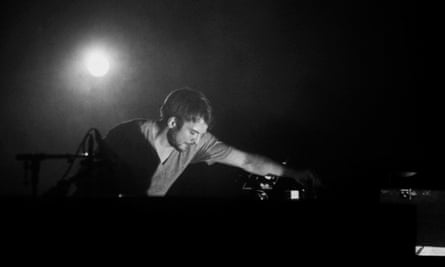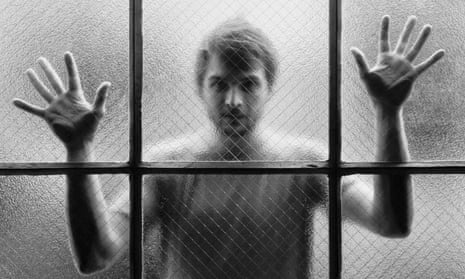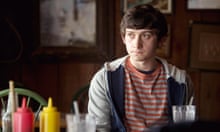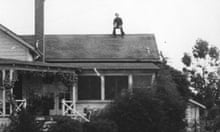In what may be the most profoundly German experience of my life, I’m sitting by the banks of the River Spree in Berlin, in the shadow of a vast, Communist-era complex of recording studios. The building once housed the state’s entire radio industry but it’s currently being used as a base by Hamburg-born composer and pianist Nils Frahm, who is telling me about the emotional resonance of toilet brushes.
“The music is dark and serious, and sounds wild and complex. But then you see what I am doing this with, and something in the head tickles. You can hit a €120,000 instrument with a $1 Ikea toilet brush!” He is, he says, challenging what an affecting musical experience can be, though he also just wants to raise a smile. “My music wants to be a physical force, which can be quite heavy, and I need a laugh.”
The 34-year-old is part of a wave of artists remodelling classical music for the 21st century. Often listed under the genre tag “neo-classical”, the “neo” is really a misnomer. Frahm is in fact closer to an older time, when composers were popular musicians writing for cash and pianists were celebrity performers. His approach, combining virtuoso musicianship with a pop hit-maker’s ear for melody, jazz’s freeform patterns and a DJ’s gift for euphoric builds, may be unorthodox but it has also put him at the forefront of his sound. His past, spent frequenting Hamburg and Berlin techno clubs, along with the electronic sounds that complement his productions, have also allowed him to find fans outside the classical community.
Frahm’s 30-plus records, chiefly culled from solo improvisations on piano, are captivating, even pyrotechnic. They have helped take him beyond the genre’s conventional home of tiny Arts-Council-and-polite-applause venues, or Radio 3’s graveyard shift, and today, he’s as likely to front a session for dance music website Boiler Room as he is to play a sold-out show at the Royal Albert Hall. But Frahm isn’t sticking two fingers up at classical institutions. “I like to treat the establishment like a cushion,” he explains. “I don’t throw it out of the window, but I like to shake the dust off it. I want to expand what it can be.”
His disregard for boundaries started at a young age. Frahm was taught to play piano by the protege of the protege of Tchaikovsky, who happened to live in a neighbouring village. His photographer father also shot covers for eclectic contemporary classical and jazz label ECM, and soon a 12-year-old Frahm not only wanted to read classical sheet music but also learn “how jazz musicians play out of nothing and into nothing”. In 2006, rather than pursue an orchestra-playing career, he moved to Berlin as a jobbing technician.

He set up a home studio to record his own albums as well as those of his friends (he has worked on more 140 releases according to Discogs, including albums by fellow “neo-classical” musicians Hauschka, Hildur Guðnadóttir and Olafur Arnalds). His own breakthrough, however, came with 2013’s Spaces, a collection of live recordings released on avant-garde label Erased Tapes. Moments of remarkable beauty were paired with song titles such as Improvisation For Coughs And A Cell Phone and the 16-minute four-part movement For - Peter - Toilet Brushes - More.
Twentieth-century classical music has long been seen as a rather unsweetened pill: good for you, sure, but short on thrills for the uninitiated. Frahm sees his music another way. “I differ from Schönberg and Neue Musik because I feel like they wanted to tell people what was best for them,” he says, referencing the high-modernist school who cemented the impression of modern classical as high-minded and abstruse. Playing at the extremes of atonality, things like rhythm and melody became bourgeois parlour tricks. They intended to educate the listener, instead of putting enjoyable experiences first, but Nils has no interest in such top-down treatments of audiences. He wants to entertain you. “I only can say what I feel and offer to share it with others,” he says. “I don’t want to be exclusive.”
At the same time, Frahm cheerfully admits that he’s not above manipulating audiences. His music is emotive to a fault and, transferred to a live setting, it can make, he says, “some people cry, some people have emotional meltdowns and some people faint”.

“I need to act like a psychologist. I need to open people up so that I can put something inside them,” he continues. “It’s Nils Frahm propaganda. I like changing the state of emotions, the patterns in our brains.” He is interested in details – even down to how the act of walking onstage might affect the way a piece is received – but firmly insists: “Why I want to manipulate people is not important. What is important is that my manipulation works.”
Inside Frahm’s rehearsal room, a Communist-designed imitation of an 18th-century chamber in faux-French aristocrat gold, I experience that manipulation first-hand. He starts to play each of the 10 keyed instruments that surround him, his trainer-clad feet moving quickly across the floor. The sketches are played as easily as chatting, each so pretty I hold my breath. I’m suddenly, strikingly moved. I’m also reminded of how Frahm once talked about being influenced by 1970s comedian Andy Kaufman.
“He played with people’s feeling and expectations, and put them through a journey that was much more profound: was it real, was it a failure, or was it a planned thing?” he says when I bring up the comparison. “I learned from him that certain things need to be uncertain, and to get people involved in what you are doing, you need to make them surprised.”
That’s interesting, I say, and Frahm jumps in his seat.
“I just surprised you! So you’ll remember it,” he says, eyes locked on mine. “Only in a state of surprise, positive or negative, do you learn something new. This should be my music. [Kaufman] is a beautiful one-trick pony. Like I am.”
I can’t help thinking that Frahm is selling himself a little short. We are meeting in the middle of an especially busy year: this month alone he will have played a six-hour set at the Louvre, soundtracked a short film with Robert De Niro, dropped a single with hip-hop producer DJ Shadow and released his second book, featuring pictures taken by his father alongside his own sheet music. July brings his trip-hop and psych-funk indebted album, recorded with two schoolmates under the name Nonkeen. There’s also Possibly Colliding, the festival he’s curated for London’s Barbican Centre this weekend, with electronic, jazz and classical musicians spanning Penguin Cafe, Wildbirds & Peacedrums and the Britten Sinfonia.
“I could do less, but that would be holding something back,” he explains. “If you do something mediocre, you will vanish between the cracks. It gives me the more energy back, the more I send out.” That’s one way to talk about one’s increasing success, but Frahm seems unlikely to ever fall through those cracks. He absent-mindedly walk around tweaking his instruments after playing. “[I’m] getting used to a stronger exchange of energy.”
Frahm curates Possibly Colliding at the Barbican, EC2, Fri to 3 Jul; the book Sheets Zwei is out on Wed via Faber Music; Oddments Of The Gamble by Nonkeen is out on 15 Jul









Comments (…)
Sign in or create your Guardian account to join the discussion